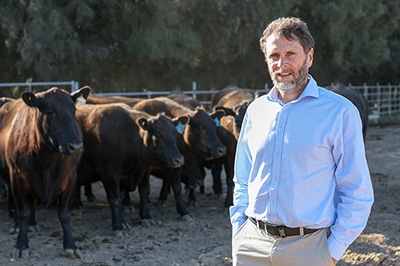Jul 8 2019
An international group of researchers has demonstrated that cattle can be bred to minimize their methane emissions.
 (Image credit: University of Adelaide)
(Image credit: University of Adelaide)
In the study reported in the journal Science Advances, the scientists show that the genetics of an individual cow had a strong influence on the composition of the microorganisms in its rumen (the first stomach in the digestive system of ruminant animals, including cattle and sheep).
What we showed is that the level and type of methane-producing microbes in the cow is to a large extent controlled by the cow’s genetic makeup. That means we could select for cattle which are less likely to have high levels of methane-producing bacteria in their rumen.
Professor John Williams, Project Leader and Co-Author, School of Animal and Veterinary Sciences, University of Adelaide
Cattle and other ruminants are important producers of the greenhouse gas methane—accounting for 37% of the methane emissions due to human activity. Typically, a single cow yields between 70 and 120 kg of methane per year and, across the world, there are around 1.5 billion cattle.
The research is the result of a project known as RuminOmics, headed by the Rowett Institute at the University of Aberdeen and involving the Parco Tecnologico Padano in Italy (where Professor Williams used to work), the Ben-Gurion University of the Negev in Israel, and several other institutions in Europe and the United States.
The scientists examined the microbiomes from ruminal fluid samples of 1000 cows. They also quantified the cows’ feed intake, methane production, milk production, and other biochemical characteristics. This research was performed on dairy cows; however, the heritability of the kinds of microbes in the rumen should also be applicable to beef cattle.
“Previously we knew it was possible to reduce methane emissions by changing the diet,” stated Professor Williams. “But changing the genetics is much more significant—in this way we can select for cows that permanently produce less methane.”
According to Professor Williams, breeding for low-methane cattle will, however, rely on selection priorities and how much it compromises selection for other preferred characteristics, for example, milk production, meat quality, or disease resistance.
“We now know it’s possible to select for low methane production,” he added. “But it depends on what else we are selecting for, and the weighting that is placed on methane—that’s something that will be determined by industry or society pressures.”
Furthermore, the scientists discovered a link, though not as high, between the microbiomes of the cows and the efficiency of their milk production.
We don’t yet know, but if it turned out that low-methane production equated to greater efficiencies of production—which could turn out to be true given that energy is required to produce the methane—then that would be a win, win situation.
Professor John Williams, Project Leader and Co-Author, School of Animal and Veterinary Sciences, University of Adelaide
This study, conducted at the Davies Research Centre at the University of Adelaide’s Roseworthy campus, supports the University’s industry engagement priority in agrifood and wine, and in handling the grand challenge of environmental sustainability.